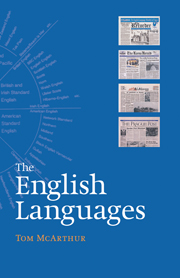Summary
model… 14 a : a description, a collection of statistical data, or an analogy used to help visualize often in a simplified way something that cannot be directly observed (as an atom) b : a theoretical projection in detail of a possible System of human relationships (as in economics, politics, or psychology)…
(definition, Philip Babcock Gove (ed.), Webster's Third New International Dictionary, Springfield, Mass., 1966)Describing a ‘language’: Two truisms and three modeis
The first truism is that the day-to-day language acts of users of English worldwide - thought, spoken, written, typed, printed, broadcast, taped, telephoned, faxed, and emailed - are so vast and varied that no person, group, or System could ever catch and catalogue them all. Even the most extensive, subtle, and flexible Computer corpus currently imaginable could not encompass all the registers and usages of Standard English, leave alone the rest. No language has ever been easy to describe and catalogue, but the relatively modest scale of most of the world's languages has allowed - and still allows in many cases - a sense of comprehensiveness in relation to any grammars, dictionaries, and other works associated with them. But the scale of present-day English does not permit any such comfortable illusion.
The second truism is that since total knowledge of the subject is impossible, our efforts to describe, prescribe for, and teach English - however extensive, elegant, and influential they may be - are incomplete, indirect and, in the last analysis, fictive. As a consequence of insight and effort there has often been an impressive match (as far as we can teil) between scholarly modeis and the System likely to underlie the ungraspable whole, resulting in many eminently practical achievements. But all the modeis ever made are exercises of the imagination, not embodiments of God's truth.
In addition, and paradoxically, each new descriptive and explanatory framework adds to the complexity of what there is to study, and may in due course become an object of investigation in its own right, part of received tradition. What is more, such a framework may serve to underpin and validate the methodology and content of English teaching in particular places for particular purposes at particular times.
- Type
- Chapter
- Information
- The English Languages , pp. 78 - 101Publisher: Cambridge University PressPrint publication year: 1998
- 1
- Cited by



